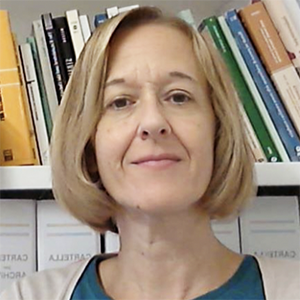

Marina Cacace
Marina Cacace has been involved in social research for almost three decades, mainly in the field of gender studies. In particular, she has explored the contrast between the increasing recognition of women and their competences in various social and professional fields, and the persistence of phenomena of marginalisation and inequality, from the most subtle to the most blatant.
From this perspective, she has also been interested in the evolution of the feminist movement in contemporary societies, post-colonial feminist studies and the relationship between feminism and younger generations. In recent years, she has led several projects aimed at promoting gender equality in universities and scientific institutions.
Her research interests also include the relationship between science and society, the analysis and measurement of poverty and social exclusion, and the use of complexity-informed approaches and methods to assess the impact of social policies and programmes of different kinds. In addition to research activities, she has often carried out monitoring, technical assistance and evaluation of projects and training activities.
As part of her professional activities, she has carried out research on behalf of various organisations. Among them, the European Commission (DG Employment and DG Research), the Inter-American Development Bank, the World Bank, some organisations of the United Nations system (UNDESA, UNV, UNCHS), the Glocal Forum, the European Society of Clinical Microbiology and Infectious Diseases (ESCMID), the Ministry of Labour and the Lazio Region. She was one of the founding members of ASDO in 1995 and was its coordinator for several years.
Since its foundation, she has participated in the basic research activities promoted by the School of Sociology and Human Sciences, of which she was scientific director from 2009 to 2015. In recent years, her interest in this field has focused on the challenges of complexity and interdisciplinarity in the study of phenomena of social change.
Selected publications:
• Cacace, M., Pugliese, F., Tzanakou, C., Müller, J., Denis, A., & Sangiuliano, M. (2023). Certifying complexity? The case of a European gender equality certification scheme for research-performing organizations. Science and Public Policy, scad069.
• Mergaert, L., Cacace, M., & Linková, M. (2022). Gender Equality Impact Drivers Revisited: Assessing Institutional Capacity in Research and Higher Education Institutions. Social Sciences, 11(9), 379.
• Gaiaschi, C., Veneri, C., & Cacace, M. (2022). Gendering Knowledge in Research Organisations and Higher Education. The Case of the Medical Sciences. Scuola democratica, 13(1), 65-84.
• Bleijenbergh, I., Cacace, M., Falcinelli, D., del Giorgio, E., & Declich, G. (2020). How Dutch and Italian women’s networks mobilize affect to foster transformative change towards gender equality. European Journal of Women’s Studies, 1350506820941136.
• Kalpazidou-Schmidt, E., Cacace, M. (2019), “Setting up a Dynamic Framework to Activate Gender Equality Structural Transformation in Research Organizations”, Science and Public Policy, 46(1)
• Kalpazidou-Schmidt, E., Cacace, M. (2017), “Addressing gender inequality in science: The multifaceted challenge of assessing impact”, Research Evaluation, 26(2)
• Huttner, A., Cacace, M. (equal contribution), d’Andrea, L., Skevaki, C., Otelea, D., Pugliese, F., Tacconelli, E. (2017), “Inequality dynamics in the workplace among microbiologists and infectious disease specialists: a qualitative study in five European countries”, Clinical Microbiology and Infection, 23(5)
• Cacace, M., Balahur, D., Bleijenbergh, I., Falcinelli, D., Friedrich, M., Kalpazidou Schmidt, E. (2015), Structural Transformation to Achieve Gender Equality in Science. Guidelines, STAGES project
http://www.stages.unimi.it/upload/documents/Guidelines_STAGES_new.pdf
• Tacconelli, E., Poliak, M., Cacace, M., Caiati, G., Benzonana, N., Nagy, E., Kortbeek, T. (2012), “Science without meritocracy. Discrimination among European specialists in infectious diseases and clinical microbiology: A questionnaire survey”, BMJ Open, vol. 2, issue 6
• Cacace, M. (2010), “Le donne come attori del mutamento nella sfera pubblica”, in: Biancheri, R. (edited by), Il genere della partecipazione, Pisa, Plus
• Cacace, M. (2009), Guidelines for gender equality programmes in science, PRAGES project
https://ec.europa.eu/research/swafs/pdf/pub_gender_equality/prages-guidelines_en.pdf
• Cacace, M., Taurelli, S. (2007), La qualità formativa. Linee guida per un modello di valutazione nell’ottica del lifelong learning, Roma, EdUp
• Quaranta, G., Quinti, G., con Cacace, M. e Marta, F. (2005), Esclusione sociale e povertà. Contributo per la conoscenza e la misurazione dei rischi sociali e ambientali nel contesto internazionale, CERFE, Roma
http://www.cerfe.org/public/RESP.pdf
• Cacace, M. (2004), Femminismo e generazioni. Valori, culture e comportamenti a confronto, Milano, Baldini, Castoldi & Dalai
• Cacace, M., Quaranta, G., Quinti, G. (2003), Glocalization: Research Study and Policy Recommendations, CERFE-World Bank-Glocal Forum
http://www.cerfe.org/public/GLOCAL.pdf
